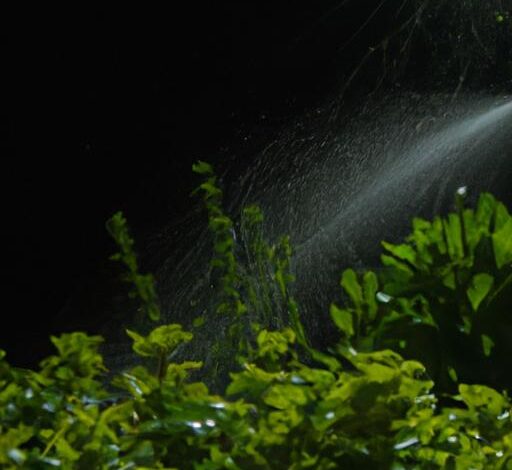Should Plants Be Watered at Night?

When it comes to nurturing our plants, we all strive to provide the best care possible. One common question that often arises is whether plants should be watered at night. Watering plants at the right time is crucial for their overall health and growth. In this article, I will delve into the effects of watering plants at night and explore the pros and cons associated with this practice.
Watering plants properly is essential to their survival. Just like humans, plants rely on water to thrive. It helps them absorb nutrients, maintain turgidity, and carry out various metabolic processes. However, the timing of watering is equally important. Many gardeners are divided on the issue of watering plants at night, and it’s time we shed some light on this topic.
So, should plants be watered at night? The answer isn’t as straightforward as it may seem. While there are benefits to watering plants at night, there are also potential drawbacks that need to be considered. In the following sections, I will explore the effects of watering at night on plant health, discuss the pros and cons, and provide you with some best practices for watering your precious greens.
Are you ready to unravel the mysteries of watering plants at night? Let’s dive in and explore the fascinating world of plant care together.
The Effect of Watering at Night on Plant Health
Understanding the Natural Processes of Plants During the Night
To determine whether watering plants at night is beneficial or detrimental, it is important to understand the natural processes that occur in plants during this time. During the night, plants undergo a process called transpiration, where they release moisture through their leaves. This process is essential for nutrient absorption and overall plant health. However, it also means that plants tend to conserve water during this period, focusing on internal processes rather than active growth.
Potential Negative Impacts of Watering Plants at Night
While it may seem convenient to water plants at night, there are potential negative impacts to consider. One such concern is the increased risk of fungal diseases. When plants are watered in the evening, the moisture can linger on the leaves and create a favorable environment for fungal growth. Without enough time to dry before the cooler night temperatures, leaves may remain damp, promoting the development of diseases like powdery mildew or leaf spot.
Additionally, watering plants at night can lead to inadequate drying time for foliage. This prolonged moisture can create an environment conducive to rotting, especially if the plants are susceptible to such conditions. Certain plant species, such as succulents or cacti, are particularly sensitive to excessive moisture and may suffer from root rot or other issues if watered at night.
Understanding the natural processes of plants during the night and considering the potential negative impacts of watering at this time helps us make informed decisions about the best watering practices for our plants. In the next section, we will explore the advantages of watering plants at night to gain a comprehensive perspective on this matter.
Pros of Watering Plants at Night
Conserving Water through Reduced Evaporation
One significant advantage of watering plants at night is the conservation of water. During the day, when the sun is high and temperatures soar, water applied to the soil can quickly evaporate, leading to wastage. By watering your plants in the evening or at night, you can minimize evaporation and ensure that more water reaches the roots, where it is needed most. This not only helps in water conservation but also promotes efficient plant hydration.
Protection against Extreme Daytime Temperatures
Extreme heat can be detrimental to plant health, causing wilting and stress. By watering plants at night, you provide them with a refreshing drink just before they face the scorching daytime temperatures. The coolness of the water helps to lower the plant’s temperature and fortify it against potential heat stress. Additionally, watering at night allows the roots to absorb moisture gradually, making it easier for the plants to withstand hot weather conditions.
Catering to Specific Plant Needs (e.g., Nocturnal Plants)
Some plants have unique needs that make watering at night beneficial. Nocturnal plants, for instance, are adapted to thrive during the nighttime hours. Watering them at night aligns with their natural rhythm and supports their growth and development. By providing water during their active period, you enhance their overall health and ensure they receive the necessary hydration when they need it the most.
By capitalizing on the pros of watering plants at night, you can create an optimal environment for your green companions. From conserving water to protecting against extreme temperatures, and catering to specific plant needs, this watering practice offers several advantages. However, it is essential to remember that there are also potential downsides to consider. In the next section, we will explore the cons of watering plants at night, providing you with a comprehensive understanding of both sides of the debate.
Cons of Watering Plants at Night
While watering plants at night may seem convenient, it is important to consider the potential drawbacks associated with this practice. Here are some cons to keep in mind:
Increased Risk of Fungal Diseases
Watering plants at night creates a favorable environment for fungal diseases to thrive. Moisture on the leaves and in the soil can encourage the growth of fungi, such as powdery mildew and leaf spot. These diseases can weaken the plants, hinder their growth, and even lead to their demise. It is crucial to strike a balance between providing enough moisture for your plants and avoiding excess dampness that can promote fungal growth.
Lack of Time for Foliage to Dry Properly, Leading to Potential Rotting
When plants are watered at night, they do not have sufficient time to dry before the cooler evening temperatures set in. Excess moisture on the foliage can create a damp environment that is conducive to rotting and disease development. Leaves that remain wet for extended periods are more susceptible to fungal and bacterial infections. To prevent such issues, it is advisable to water plants during the day, allowing ample time for the leaves to dry before nightfall.
Negative Impact on Certain Plant Species
Not all plants respond well to nighttime watering. Some plant species, particularly those native to arid regions, are adapted to absorb water during the day and require a period of dryness at night. Watering these plants at night can disrupt their natural growth patterns and lead to root rot or other complications. It is essential to research the specific watering needs of each plant species in your garden to ensure you provide the appropriate care.
By being aware of these potential cons, you can make informed decisions about when to water your plants and avoid any detrimental effects they may experience. Let’s now explore the best practices for watering plants to optimize their health and growth.
Best Practices for Watering Plants
Ideal Watering Time for Most Plants
Determining the ideal watering time for your plants can significantly impact their overall health and vitality. In general, it is recommended to water plants in the early morning or late afternoon. This allows ample time for the foliage to dry before nightfall, reducing the risk of fungal diseases. Watering in the early morning also ensures that plants are adequately hydrated to withstand the heat of the day.
Factors to Consider When Determining Watering Schedule
While a general guideline exists for watering plants, it’s essential to consider various factors that can influence the watering needs of specific plants. Factors such as the type of plant, soil composition, climate, and season all play a role in determining the watering schedule. Plants in hot and arid climates may require more frequent watering, while those in cooler and more humid regions may need less frequent watering.
To accurately assess the watering needs of your plants, it is crucial to monitor the moisture levels in the soil. Stick your finger into the soil up to the second knuckle; if it feels dry, it’s time to water. However, if it feels moist, it’s best to hold off on watering to prevent overhydration and potential root rot.
Ensuring Proper Drainage and Soil Moisture Balance
Proper drainage is vital for the health of your plants. Stagnant water can suffocate the roots and promote the growth of harmful pathogens. Ensure that your pots or planting beds have adequate drainage holes to allow excess water to escape. Additionally, consider using well-draining soil mixes that prevent waterlogging.
Maintaining a balance of soil moisture is equally crucial. Overwatering can lead to waterlogged soil, causing root rot and depriving plants of oxygen. On the other hand, underwatering can lead to dehydration and hinder the plant’s ability to absorb nutrients. Strive for a balance by watering thoroughly until the soil is evenly moist, but not saturated.
By following these best practices, you can provide your plants with optimal hydration and promote their overall well-being. Remember to consider the specific needs of your plants, monitor soil moisture levels, and ensure proper drainage for healthy and thriving greenery.
Conclusion
After exploring the effects of watering plants at night, weighing the pros and cons, and considering best practices, we can draw some conclusions. While there are advantages to watering plants at night, such as water conservation and protection against extreme daytime temperatures, there are also potential downsides, including an increased risk of fungal diseases and insufficient drying time for foliage.
To ensure the optimal health and growth of your plants, it is important to strike a balance. Instead of relying solely on watering at night, consider factors such as plant species, climate conditions, and soil moisture levels. Aim to water your plants during the early morning hours when the temperatures are cooler, allowing for adequate absorption and evaporation throughout the day.
Remember, each plant has its own unique requirements. Some plants may thrive with nighttime watering, while others may suffer. Understanding the specific needs of your plants and monitoring their responses to different watering schedules will help you tailor your care accordingly.
In the end, the key is to be observant, adaptable, and responsive to your plants’ needs. By providing them with the right amount of water at the right time, you can foster their growth, prevent diseases, and create a thriving garden that will be the envy of all. So, keep your watering can handy, be mindful of the time, and let your plants flourish under your loving care.
Now that you have a better understanding of the question “Should plants be watered at night?” and the factors to consider, go ahead and put your knowledge into practice. Your plants will thank you with vibrant blooms, lush foliage, and an overall healthy demeanor. Happy gardening!
Conclusion: So above is the Should Plants Be Watered at Night? article. Hopefully with this article you can help you in life, always follow and read our good articles on the website: esports.bentreonline.com





